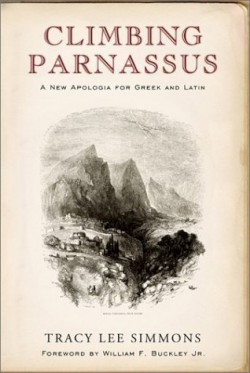Climbing Parnassus
A New Apologia For Greek and Latin
Lofted by the limestone faces of Mt. Parnassus that peer stoically over Grecian lowlands, Apollo and the nine Muses wait, amongst wild aesthetic bluffs and craggy intellective pathways. Standing as a symbol of the daunting challenges of classical education, the mountain rewards climbers with the riches of knowledge for each foothold. Yet only at the crest of the unrelenting climb are the latent spoils of the journey revealed, analogous to those found in the mastery of the Greek and Latin languages—“the cultivation of mind and spirit.”
The author launches a fury of insight and foresight into education, both classical and modern, by navigating swampy terminology, in an effort to position key diversions in meaning. The “Liberal Arts,” which once promoted reflective life and freedom, today “rest comfortably in a haze where it no longer calls us to commit to anything exemplary, hard or heroic.” Similarly, the word “culture” fails to conjure specific meanings. Better suited for “the over-degreed and half-educated,” Simmons asserts that “the term culture began to split like an atom…Culture is any chunk of social reality you like or dislike.”
The author, who has a Masters degree in Classics from Oxford and was a journalist for the National Review, unearths the roots of classical education, including the blossoming of Humanism in the Age of Renaissance and the truncation of “Ciceronianism,“which stunted language growth by limiting words, and its eventual abandonment following the ravages of modern war. The author makes clear that there are many benefits in revamping modern education to reinstate classical languages. Promoting structured thought, concise phrasing, and an expanded vocabulary by virtue of understanding the etymologies of words are some reasons to sound an inspired call for its renovation and reconciliation.
Trenchant observations, serrated by Simmons’ informal inflection, make accessible a subject that may otherwise seem elitist. Although perhaps most appreciated by students of classical languages, history, philosophy, and education, Climbing Parnassus may exude an intoxicating appeal to a more vast audience, disarmed by style and spurred by relevance. Buttressed cleanly by a three-part format, the text is dense with engaging insights, haunting quotes, and succinct truths, which might have benefited from a less taxing blueprint. A complete bibliography rounds out the academic flair.
Sir Richard Livingstone proposed: “One great danger of the modern world is our susceptibility to the general ideas that float around us, thick as bacilli, in the air, that pass our lips so often, and are so influential in our lives.” Guarding against the pathology of complacency that creates a populace of unwitting vectors for a collective decline, Simmons prescribes a return to classical ideals. Atop Parnassus, the thinned air of discipline and labor fills mind and spirit—aerating lungs and infusing cerebral torrents with the fluid purity intrinsic to any summit.
Disclosure: This article is not an endorsement, but a review. The publisher of this book provided free copies of the book to have their book reviewed by a professional reviewer. No fee was paid by the publisher for this review. Foreword Reviews only recommends books that we love. Foreword Magazine, Inc. is disclosing this in accordance with the Federal Trade Commission’s 16 CFR, Part 255.

